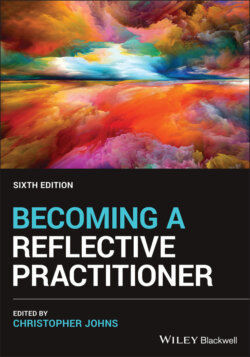Читать книгу Becoming a Reflective Practitioner - Группа авторов - Страница 78
Did My Feelings and Attitudes Influence Me?
ОглавлениеOur feelings and emotions are most often the trigger for reflection, notably negative feelings such as a sense of failure, frustration, distress, anger, fear of authority with its threat of sanction for doing the wrong thing. They create an emotional tension within us, making us pay attention to our experiences. Senge (1990) argues that we need to deal with emotional tension before we can focus on creative tension, as if emotions smudge the mirror and distort rational thought. Boud et al. (1985) also suggest we need to remove obstructive feelings as part of the reflective process. The feelings we experience also reflect the attitudes we hold.
Feelings reflect deeper underlying assumptions the practitioner may hold about the world but which they may not be aware of. As Cox (1988, p. 100) notes: ‘The therapist’s attitudes colour the atmosphere of therapeutic space. He is never as neutral as he thinks’. For example, ‘do I like this person?’ that link with theories of the unpopular patient (see later cue).
Clearly, feelings and attitudes influence decision‐making (Callahan 1988) and need to be understood and shifted if the practitioner is to realise desirable practice. Yet, they may not be easy to understand. They may stem from diverse sources. Ramos (1992) writes of an ‘emotional impasse’ where practitioners become emotionally entangled with patients. Dealing with the other’s suffering may be difficult for many practitioners. It may be easier to avert your eyes and turn away rather than engage. Maybe it is more comfortable to turn away, and yet that itself creates anxiety for the practitioner anxious to respond effectively.
Because negative feelings and fears are uncomfortable, practitioners are likely to reflect in order to defend themselves against negative feelings, drawing on defence mechanisms such as rationalization, sublimation, and projection,1 rather than face up to them. However, negative feelings drain the practitioner’s energy. How often you heard practitioners cry ‘I’m drained!’
The practitioner may reflect superficially to avoid going deeper that might reveal deeper psyche factors or emotional scars that may be better left alone (Sacks 1976). Guidance is certainly helpful to engage negative feelings and unhelpful attitudes (see Chapter 6).
By paying attention to their feelings, the practitioner learns to know and manage their emotional self (Salovey and Mayer 1990). Hence what made me frustrated, angry, or fearful, I can understand and work towards resolving. Understanding itself is a balm for the worried mind simply because it brings some element of control.
As we reflect, we can begin to accept the feelings as our own rather than something that might destroy us. As Rosenberg (1998) notes, ‘little by little, we’re not so enslaved to things’ (p. 145). At every point, reflection is freedom to become who we desire to be. Beck (1997) recognises the discomfort reflection on feelings may incur but that it is worth it in long run. She writes (p. 42/3):
For a time our life may feel worse than before, as what we have concealed becomes clear. But even as this occurs, we have a sense of growing sanity and understanding, of basic satisfaction. To continue practice through severe difficulties we must have patience, persistence and courage…. we learn in our guts not just in our brains.
Reading these words may give an impression that reflection is akin to therapy. Perhaps it will feel like that at times. It is these deeper reaches of the mind where old stuff lies buried, stuff that is fundamental to the assumptions we hold and which govern our practice. If we are to gain insight, then it is necessary to access and shake up these assumptions. If not, then we may merely scratch at the surface of our experience without meaning. Sometimes it may seem better to reflect superficially rather than get out of our depth. It depends on how significant such feelings are perceived.
